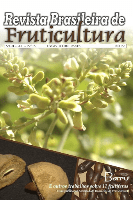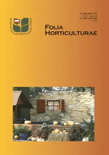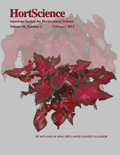
HORTICULTURAL SCIENCE
Scope & Guideline
Sowing Seeds of Knowledge in Horticultural Science.
Introduction
Aims and Scopes
- Plant Physiology and Biochemistry:
The journal focuses on the physiological processes in horticultural plants, including studies on stress responses, metabolic pathways, and biochemical characteristics that influence growth and quality. - Cultivation Techniques and Innovations:
Research on advanced horticultural techniques such as tissue culture, grafting, and irrigation management is emphasized, aiming to improve crop yield and quality. - Pest and Disease Management:
The journal addresses the identification and management of pests and diseases affecting horticultural crops, including studies on genetic resistance and biocontrol methods. - Environmental Impact and Sustainability:
There is a consistent focus on the environmental aspects of horticulture, including sustainable practices, soil health, and the impact of climate change on crop production. - Genetic Diversity and Breeding:
The exploration of genetic resources and breeding strategies for crop improvement, focusing on traits such as disease resistance, yield potential, and fruit quality.
Trending and Emerging
- Stress Tolerance Mechanisms:
There is an increasing focus on understanding how horticultural crops respond to abiotic stresses such as drought, salinity, and temperature extremes, which is critical for improving resilience in changing climates. - Biotechnology and Genetic Engineering:
Research involving genetic modification and biotechnological approaches for crop improvement is on the rise, highlighting the journal's commitment to cutting-edge science in plant breeding. - Sustainable Practices and Organic Horticulture:
Emerging themes include the adoption of sustainable and organic horticultural practices that promote environmental health and reduce reliance on chemical inputs. - Postharvest Physiology and Quality Management:
There is a growing emphasis on postharvest processes, including storage techniques and quality maintenance, which are crucial for enhancing the marketability and shelf-life of horticultural produce. - Digital Agriculture and Precision Horticulture:
The integration of technology in horticulture, including the use of UAVs (drones), smart irrigation systems, and data analytics for precision farming, is increasingly being explored.
Declining or Waning
- Traditional Horticultural Practices:
There has been a noticeable decline in research focused on traditional horticultural methods, as newer, more innovative techniques and technologies gain attention. - Basic Agronomy and Soil Management:
Studies that primarily address basic agronomic practices without a horticultural focus are becoming less frequent, with more emphasis placed on integrated approaches that consider plant interactions with the environment. - Generalized Pest Control Methods:
Research on broad-spectrum pest control methods is declining in favor of more targeted, sustainable practices that emphasize ecological balance and integrated pest management.
Similar Journals

BRAGANTIA
Exploring Frontiers in Agricultural and Biological SciencesBRAGANTIA, published by the Instituto Agronômico, is a distinguished open access journal that has been a vital resource since its inception in 1977. With an ISSN of 0006-8705 and E-ISSN 1678-4499, this journal is recognized for its contributions to the field of Agricultural and Biological Sciences, where it currently holds a respectable Q2 ranking as of 2023. Additionally, BRAGANTIA is indexed in various databases, supporting its impact within Materials Science (Q3 ranking). Positioned in Brazil, the journal promotes the dissemination of high-quality research, aiming to bridge the gap between academia and practical applications in agricultural innovation and sustainability. Researchers, professionals, and students looking to keep abreast of recent advancements and their implications will find BRAGANTIA to be an indispensable platform for sharing and accessing vital agricultural knowledge.

Revista Fitotecnia Mexicana
Empowering Professionals Through Cutting-Edge ResearchRevista Fitotecnia Mexicana is a prominent academic journal published by the SOC MEXICANA FITOGENETICA, dedicated to advancing knowledge in the fields of agronomy, crop science, genetics, horticulture, and plant science. With its establishment dating back to 2007 and currently running through 2024, this journal serves as an important platform for researchers, professionals, and academic institutions interested in plant genetic resources and agricultural innovations. Although it holds a Q4 quartile ranking in various categories and is positioned within the lower percentiles in Scopus rankings, it provides crucial insights and opportunities for emerging ideas and local research initiatives. Based in Mexico, and with its indexed ISSN 0187-7380, the journal plays an important role in stemming from the rich agricultural heritage of the region. The lack of open access options underscores the depth of curated content provided, making it a valuable resource for professionals seeking to expand their expertise in the sector.

Ornamental Horticulture-Revista Brasileira de Horticultura Ornamental
Elevating Ornamental Horticulture ResearchOrnamental Horticulture - Revista Brasileira de Horticultura Ornamental, published by the SOC BRASILEIRA FLORICULTURA & PLANTAS ORNAMENTAIS, serves as a premier platform for disseminating high-quality research in the field of ornamental horticulture. With an Open Access model in place since 1995, this journal ensures that valuable findings in horticultural science reach a wide audience, fostering greater collaboration within the global community. Based in Brazil, this journal primarily focuses on the cultivation, management, and improvement of ornamental plants, contributing significantly to both the scientific and practical aspects of the horticulture industry. It has achieved esteemed rankings, including being classified in the Q2 quartile for Horticulture and Q3 for Plant Science in 2023, demonstrating its academic rigor and relevance. Scopus ranks it at 54th in Horticulture and 278th in Plant Science, positioning it among leading scholarly resources in these fields. The journal is committed to advancing knowledge through innovative research that aids in the sustainable development of ornamental horticulture practices.

Molecular Horticulture
Exploring the Intersection of Science and SustainabilityMolecular Horticulture is a prestigious journal published by SpringerNature, dedicated to advancing knowledge in the fields of Agronomy, Crop Science, Horticulture, and Molecular Biology. Based in the United Kingdom, this journal, with ISSN 2730-9401, is recognized for its high-quality, peer-reviewed research and has rapidly established itself within the academic community, achieving a remarkable Q1 ranking across its relevant categories as of 2023. With a strong focus on innovative research that explores the intersection of molecular biology and horticultural science, Molecular Horticulture provides valuable insights that are essential for researchers and professionals aiming to enhance crop production and sustainability practices. As part of the Scopus database, the journal ranks impressively within its fields, holding notable positions such as Rank #7 in Horticulture and Rank #42 in Agronomy and Crop Science. While currently published through traditional access models, the journal remains accessible to a wide audience of scientists, educators, and students eager to stay informed on the latest discoveries and trends in plant science.

Revista Brasileira de Fruticultura
Innovating Horticulture for a Sustainable FutureRevista Brasileira de Fruticultura, published by the Sociedade Brasileira de Fruticultura, is a leading scholarly journal dedicated to the advancement of research in the fields of agronomy, crop science, food science, horticulture, and plant science. With an impressive Open Access model adopted since 2001, the journal is committed to disseminating high-quality research from Brazil and beyond, promoting innovation and collaboration among researchers, professionals, and students alike. The journal currently holds a respectable Q3 category ranking in multiple fields as of 2023, reflecting its significance within the scientific community, specifically ranked #72 in horticulture and #257 in agronomy, among its peers. The Revista Brasileira de Fruticultura not only serves as a platform for original research articles, reviews, and case studies but also emphasizes practical applications and sustainable practices in fruit cultivation. Its aim is to enhance the visibility of Brazilian fruit research on a global scale, making it an invaluable resource for those invested in advancing horticultural sciences.

Folia Horticulturae
Connecting Researchers to the Heart of Horticulture.Folia Horticulturae, an esteemed journal in the field of Horticulture, serves as a pivotal platform for the dissemination of innovative research and developments within agricultural and biological sciences. Published by SCIENDO, this open-access journal has been contributing to the global scientific community since 2004, ensuring that key findings are freely accessible to researchers, professionals, and students alike. Based in Poland, the journal boasts an impressive Q2 ranking in Horticulture, indicating its solid impact and significance in the field, with a Scopus rank of #32 out of 115, placing it in the 72nd percentile. With a commitment to fostering scientific discourse, Folia Horticulturae actively encourages contributions that explore various aspects of horticultural science, from crop management to sustainability practices. This initiative not only enhances knowledge but also advances practical applications, making it an invaluable resource for anyone interested in the intricacies of horticulture.

Scientific Papers-Series B-Horticulture
Advancing Horticultural Science for a Sustainable Tomorrow.Scientific Papers-Series B-Horticulture is a distinguished open-access journal published by the University of Agronomic Sciences and Veterinary Medicine Bucharest. With its ISSN 2285-5653 and E-ISSN 2286-1580, this journal has been accessible to the global research community since 2002, ensuring that vital horticultural research reaches a wide audience without barriers. Positioned at the forefront of the horticultural sciences, the journal serves as a platform for original research, reviews, and innovations pertaining to horticultural practices, plant physiology, and sustainable agriculture. Its contributions are not just significant in Romania but also resonate through the international scientific community, helping to address pressing agricultural challenges. The office located at 59 Marasti Boulevard, District 1, Bucharest 011464, Romania, symbolizes its commitment to advancing horticultural knowledge and fostering collaboration among researchers, professionals, and students alike. With no current H-index data, the journal invites continued contributions to enhance its visibility and impact in the field.

AMERICAN JOURNAL OF POTATO RESEARCH
Empowering Researchers to Transform Potato AgricultureAMERICAN JOURNAL OF POTATO RESEARCH is a prominent scholarly journal dedicated to the field of potato research, encompassing vital areas of Agronomy and Crop Science. Published by SPRINGER, this journal holds an impactful presence in the scientific community, as evidenced by its placement in the Q2 quartile of both Agronomy and Plant Science categories for 2023. With a Scopus rank of #145 out of 406 in Agricultural and Biological Sciences, it offers a significant platform for researchers, professionals, and students alike. Covering diverse topics from cultivation techniques to pest management, the journal aims to advance understanding and innovation in potato science, facilitating the sharing of cutting-edge research and fostering collaboration among scholars. Accessible to a global audience, the journal encourages the dissemination of knowledge through its open-access options. Since its inception in 1998, the AMERICAN JOURNAL OF POTATO RESEARCH has been committed to contributing valuable insights that drive the industry forward and support sustainable agricultural practices.

Pesquisa Agropecuaria Tropical
Exploring the forefront of agronomic research.pesquisa Agropecuaria Tropical is a premier Open Access journal dedicated to advancing the knowledge and practices within the field of agronomy and crop science. Since its inception in 1971, this peer-reviewed journal, published by the Universidade Federal de Goiás, has played a pivotal role in disseminating high-quality research from Brazil and beyond. Operating under an Open Access model, it ensures that scholarly articles are freely accessible, thereby fostering greater collaboration and innovation. With a Scopus ranking placing it in the 32nd percentile among its peers in agricultural and biological sciences, and a current classification in the Q3 category of agronomy and crop science, the journal serves as an essential resource for researchers, professionals, and students alike. As it continues its publication journey from 2010 to 2024, it remains committed to contributing valuable insights and advancements in the agricultural sector, ultimately influencing sustainable practices and food security.

HORTSCIENCE
Connecting science and practice in horticultural education.HORTSCIENCE is a prestigious journal published by the American Society for Horticultural Science, focusing on the latest research and developments in the field of horticulture. With an ISSN of 0018-5345 and an E-ISSN of 2327-9834, this journal has established itself as a vital resource for horticultural scientists, practitioners, and educators since its inception. As of 2020, it has embraced an Open Access model, promoting the dissemination of scientific knowledge and enabling wider accessibility to its rich content. HORTSCIENCE currently holds a Q2 ranking in the Horticulture category for 2023, placing it in the top tier of its field with a Scopus rank of 36 out of 115 in the area of Agricultural and Biological Sciences. This journal publishes empirical research, significant advancements, and comprehensive reviews that contribute to the understanding and improvement of horticultural practices, making it an essential publication for anyone involved in horticultural research or education.